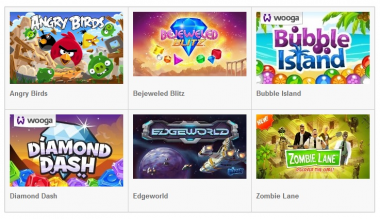Google’s Punit Soni: We’re Not Just Playing Around When It Comes to Social Gaming
After finding out yesterday that games are contributing a staggering amount to Facebook’s top line, we now know exactly how important the category is to the success of Google’s social plans.

Last week, I talked to Punit Soni, who runs games and mobile for Google+, to get an update on Google’s plan for social games. Since the conversation took place before Facebook’s filing, Soni has no direct responses to the numbers.
But he addresses in general how Google expects to challenge Facebook’s dominance in social gaming, and the big opportunity in front of them to do something different.
“There’s no point in being in this game if we are a ‘me-too,'” he said. “We want to be different.”
Yesterday, in Facebook’s IPO filing we learned that substantially all of the company’s payments revenue is coming from virtual goods from inside social games, and that one game publisher alone — Zynga — is contributing 12 percent of the company’s revenue, payments and advertising included.
At those rates, it’s easy to see why Google is emphasizing games and wooing developers to its platform.
It started off with a bang in August, when it launched games. In talking to reporters, Soni announced the company was sharing 95 percent of the revenue from virtual goods with developers, and was keeping only 5 percent for itself.
That was, and remains, much more generous than the 30 percent cut that Facebook takes.
Still, with only 36 games on its network, and far fewer users (however you want to calculate it), Soni was pretty honest about how far they still have to go. He was also extremely enthusiastic, and at times looked as if he wanted to leap out of his chair to get going on some of the projects Google had planned.
First, and foremost, he said they are working hard to get virality right; and second, they want to nail cross-platform, so that games worked seamlessly across the Web and mobile.
Viral channels are the most common way for people to learn about a game, and also one of the most controversial.
More than a year ago, Facebook was forced to dial back those channels, because users complained about receiving too many unwanted messages.
“We err on the side of caution,” Soni said. “We are slowly giving more options to do things.”
Soni said they also see a big opportunity to differentiate by offering a multiplatform approach, and letting developers build games that work across Google+, Google’s Chrome Web Store and mobile. Of course, it has an advantage because of the millions of Android users, whereas Facebook’s mobile efforts are still nascent.
Already, there are some examples of cross-platform play.
Today, you can play Rovio’s Angry Birds and Bubble Witch Saga across both Google+ and the Chrome App Store, and can pick up where you left off between the two.
“These are not Google+ games, but games that are on Google,” Soni stressed. “A lot more is coming on mobile.”

Google has also focused on getting a number of games as exclusives that launch a few weeks on Google+ before they show up on Facebook. To date, it has scored at least three titles — including a major title, Kabam’s Godfather — and there are more coming.
Asked why the game developers are willing to go exclusively on Google+, Soni said there’s some marketing that Google is willing to put toward it, but otherwise, “they are betting on us.”
He says it’s mostly the potential of the platform, and the fact that he’s receptive to feedback, that helps him understand exactly what developers need. Developers also acknowledge that supporting more platforms is helpful in reaching more players and diversifying their risk.
“If they say it’s because the platform is the best ever — no, it’s not true. But the plans we have and the sensitivity that we have for our users and developers, we will be very good sometime soon. … That’s why you are seeing exclusives.”
Soni wasn’t wiling to spill specific plans about what was launching next, but said a lot more is coming.
“We are a start-up platform. We are humble and know our flaws. As we grow, you’ll see new things. My work has barely started,” he said.








